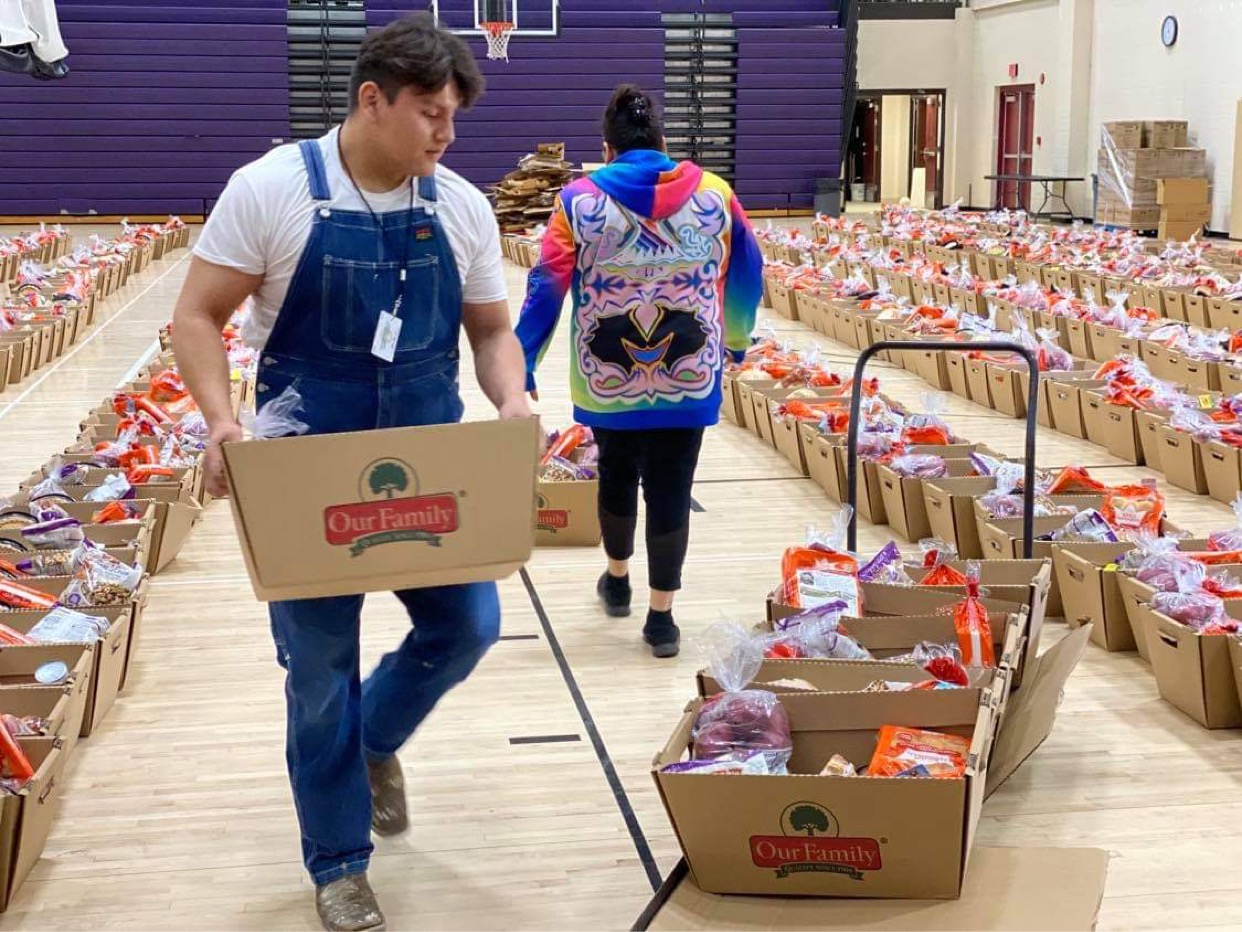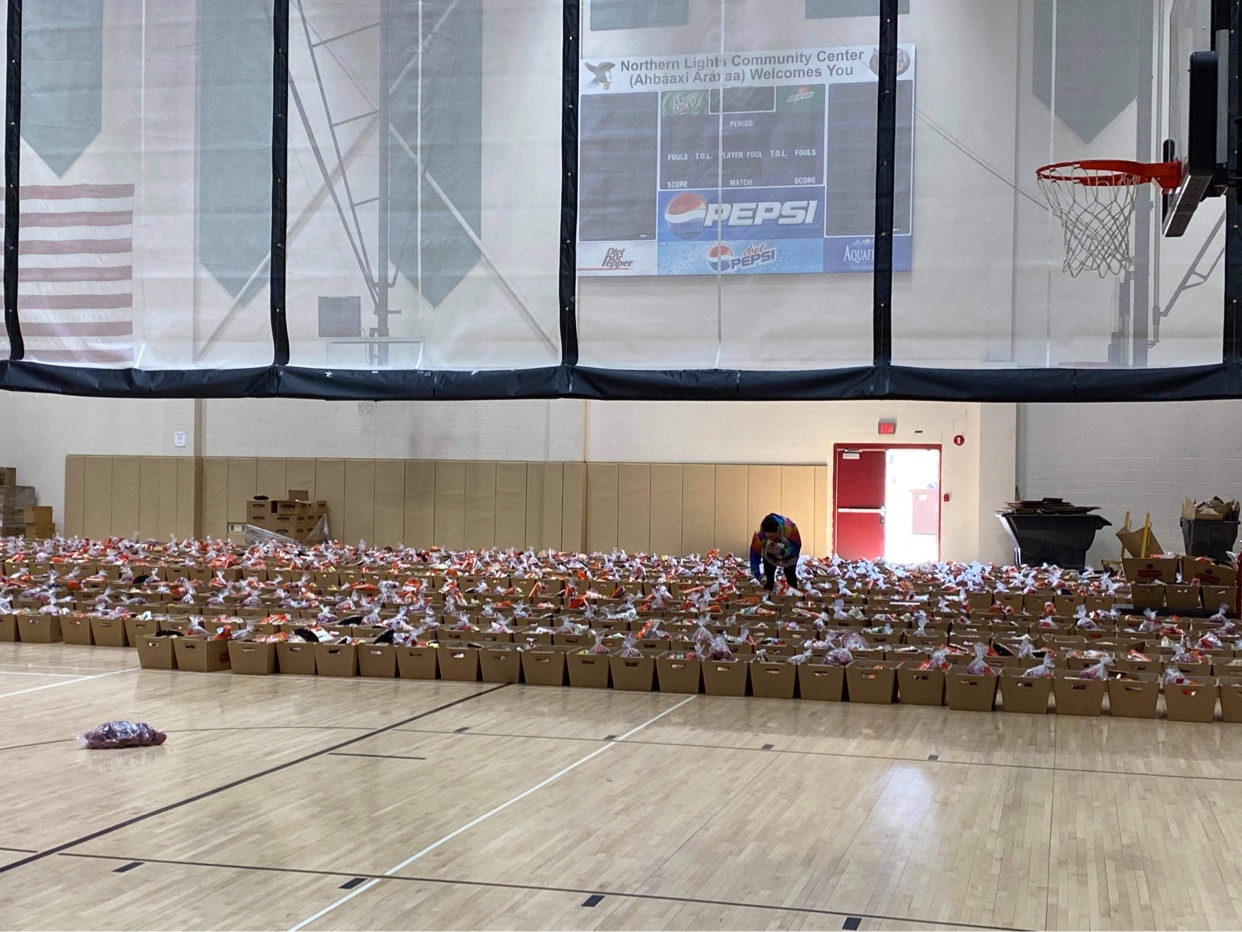
- Details
- By Darren Thompson
NEW TOWN, N.D. — In an effort to prevent additional spread of Covid-19, the Mandan, Hidatsa & Arikara — Three Affiliated Tribes — distributed their fifth care package to tribal members on Monday in preparation for Easter weekend.
“We, as a tribe, are still practicing COVID-19 safety measures,” said Mandan, Hidatsa & Arikara Councilwoman Dr. Monica Mayer to Native News Online. “Even though the vast majority of our community members have had both vaccines shots, we still are emphasizing taking precautions.”
Prior to serving as a MHA Nation Tribal Councilwoman, Dr. Monica Mayer provided direct health care as a medical doctor as well as leadership in health care as chief medical officer for the critical access center at the Belcourt Hospital on the Turtle Mountain Indian Reservation. She has been a MHA Nation Councilwoman since 2016.
The last large gathering the MHA Nation hosted was its Christmas party in December 2019, where more than 1,200 guests were served. “Since Covid, we stopped all of our large gatherings,” Dr. Mayer said.
 (Courtesy Vonnie Alberts)
(Courtesy Vonnie Alberts)
They organized, packaged and distributed 700 dinner packages for the community and 250 elder packages. Each dinner package contained ham, ten pounds of potatoes, stuffing, corn, butter, brussel sprouts, cranberries, and pies with whipped topping. “We pack everything but a drink,” said Dr. Mayer.
Elder packages include puzzles, personal organizers, herbal teas, jar openers, canned goods, hand sanitizer, Easter candy, and door prize tickets. “We encourage our elders to stay at home, but also have some things to do while continuing with their (Covid-19) mitigation measures,” she said.
Since the start of the pandemic, the MHA Nation has distributed five elder care packages to their elders. One of the packages included a blood pressure pump, digital thermometers, heating pads, and a $100 gift certificate to purchase meat when many grocery stores were scarce of food essentials in the region.
“Most of our lives are changed because of Covid-19,” said Dr. Mayer. “Vaccination is definitely key to solving this issue. As a physician, I foresee that we’re going to have another surge and the more we are prepared to deal with this disease.”
“We are the nation who suffered from the smallpox epidemic of 1837 and our entire population was nearly wiped out due to an outbreak,” Dr. Mayer added.
In 1837, an outbreak of smallpox on the Upper Missouri River killed approximately 90 percent of all Mandans and one-half of the Arikaras and Hidatsas.
To date, the vast majority of the community have had two shots of the Covid-19 vaccine, according to Emily Sitting Bear, director of the MHA Emergency Operations Center.
More Stories Like This
Native News Weekly (August 25, 2024): D.C. BriefsDeb Haaland Earns Endorsement From Communications Workers of America Local 7076
University Soccer Standout Leads by Example
Two Native Americans Named to Democratic Congressional Campaign Committee's“Red to Blue” Program
Cheyenne River Youth Project Hosts Young Women’s Winter Camp as Part of Lakota Culture Internship
Help us defend tribal sovereignty.
At Native News Online, our mission is rooted in telling the stories that strengthen sovereignty and uplift Indigenous voices — not just at year’s end, but every single day.
Because of your generosity last year, we were able to keep our reporters on the ground in tribal communities, at national gatherings and in the halls of Congress — covering the issues that matter most to Indian Country: sovereignty, culture, education, health and economic opportunity.
That support sustained us through a tough year in 2025. Now, as we look to the year ahead, we need your help right now to ensure warrior journalism remains strong — reporting that defends tribal sovereignty, amplifies Native truth, and holds power accountable.
 The stakes couldn't be higher. Your support keeps Native voices heard, Native stories told and Native sovereignty defended.
The stakes couldn't be higher. Your support keeps Native voices heard, Native stories told and Native sovereignty defended.
Stand with Warrior Journalism today.
Levi Rickert (Potawatomi), Editor & Publisher
